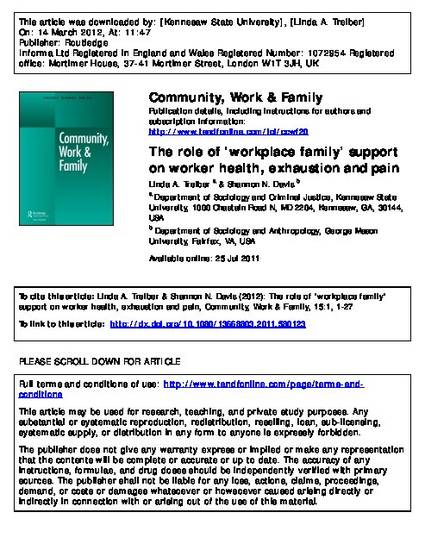
Article
The Role of ‘Workplace Family’ Support on Worker Health, Exhaustion and Pain
Community, Work & Family
(2012)
Abstract
The goal of this study was to improve understanding of the potential health benefits of social support at work. We utilized 2002 GSS data to examine the relative influence of workplace support on self-reported health, exhaustion and experience of persistent pain in a sample of 1602 workers. Building on previous Demand-Control-Support models, we examined co-worker, supervisor, and organizational safety support (conceptualized as ‘workplace family’) in concert with job demands, job control and work-family conflict as predictors of worker health measures. We further tested the extent to which work-family conflict acted as a mediator between family and work characteristics and worker health outcomes. We found that increased co-worker support in the workplace was associated with better worker self-reported health, lower exhaustion and less pain. In addition, higher levels of perceived organizational safety support were associated with better self-reported health and lowered exhaustion. There is little evidence that work-family conflict mediates between work and family characteristics and worker health, and work-family conflict does not mediate the relationship between workplace family measures and worker health. We discuss results in light of workers’ changing and expanding definitions of family, with implications for changes in the organization of the workplace to improve workers’ health.
Keywords
- worker health,
- worker pain,
- social support,
- job control,
- safety climate
Disciplines
Publication Date
2012
Citation Information
Linda A. Treiber and Shannon N. Davis. "The Role of ‘Workplace Family’ Support on Worker Health, Exhaustion and Pain" Community, Work & Family (2012):15 (1) 1-27.
